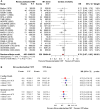Cardiac mortality in patients randomised to elective coronary revascularisation plus medical therapy or medical therapy alone: a systematic review and meta-analysis
- PMID: 34002203
- PMCID: PMC8669551
- DOI: 10.1093/eurheartj/ehab246
Cardiac mortality in patients randomised to elective coronary revascularisation plus medical therapy or medical therapy alone: a systematic review and meta-analysis
Abstract
Aims: The value of elective coronary revascularisation plus medical therapy over medical therapy alone in managing stable patients with coronary artery disease is debated. We reviewed all trials comparing the two strategies in this population.
Methods and results: From inception through November 2020, MEDLINE, EMBASE, Google Scholar, and other databases were searched for randomised trials comparing revascularisation against medical therapy alone in clinically stable coronary artery disease patients. Treatment effects were measured by rate ratios (RRs) with 95% confidence intervals, using random-effects models. Cardiac mortality was the pre-specified primary endpoint. Spontaneous myocardial infarction (MI) and its association with cardiac mortality were secondary endpoints. Further endpoints included all-cause mortality, any MI, and stroke. Longest follow-up data were abstracted. The study is registered with PROSPERO (CRD42021225598). Twenty-five trials involving 19 806 patients (10 023 randomised to revascularisation plus medical therapy and 9783 to medical therapy alone) were included. Compared with medical therapy alone, revascularisation yielded a lower risk of cardiac death [RR 0.79 (0.67-0.93), P < 0.01] and spontaneous MI [RR 0.74 (0.64-0.86), P < 0.01]. By meta-regression, the cardiac death risk reduction after revascularisation, compared with medical therapy alone, was linearly associated with follow-up duration [RR per 4-year follow-up: 0.81 (0.69-0.96), P = 0.008], spontaneous MI absolute difference (P = 0.01) and percentage of multivessel disease at baseline (P = 0.004). Trial sequential and sensitivity analyses confirmed the reliability of the cardiac mortality findings. All-cause mortality [0.94 (0.87-1.01), P = 0.11], any MI (P = 0.14), and stroke risk (P = 0.30) did not differ significantly between strategies.
Conclusion: In stable coronary artery disease patients, randomisation to elective coronary revascularisation plus medical therapy led to reduced cardiac mortality compared with medical therapy alone. The cardiac survival benefit after revascularisation improved with longer follow-up times and was associated with fewer spontaneous MIs.
Keywords: Coronary; Elective; Medical therapy; Meta-analysis; Randomised trials; Revascularisation.
© The Author(s) 2021. Published by Oxford University Press on behalf of the European Society of Cardiology.
Figures





Comment in
-
Impact of revascularisation on outcomes in chronic coronary syndromes: a new meta-analysis with the same old biases?Eur Heart J. 2021 Dec 1;42(45):4652-4655. doi: 10.1093/eurheartj/ehab330. Eur Heart J. 2021. PMID: 34110408 No abstract available.
-
In the pool: dilution or drowning?Eur Heart J. 2021 Oct 1;42(37):3882-3883. doi: 10.1093/eurheartj/ehab443. Eur Heart J. 2021. PMID: 34291791 No abstract available.
-
When a meta-analysis equals a single large-scale trial with meaningful follow-up.Eur Heart J. 2021 Oct 1;42(37):3884-3885. doi: 10.1093/eurheartj/ehab460. Eur Heart J. 2021. PMID: 34304265 No abstract available.
-
Cardiac death should be the primary endpoint for revascularization trials and meta-analyses.Eur Heart J. 2021 Dec 1;42(45):4697-4698. doi: 10.1093/eurheartj/ehab676. Eur Heart J. 2021. PMID: 34545390 No abstract available.
-
Cardiac mortality, adequate power, and objective inclusion of the entire evidence are key to accurately define the long-term effect of revascularisation vs. medical therapy alone in stable coronary syndromes.Eur Heart J. 2021 Dec 1;42(45):4699-4700. doi: 10.1093/eurheartj/ehab677. Eur Heart J. 2021. PMID: 34545407 No abstract available.
References
-
- GBD 2019 Demographics Collaborators. Global age-sex-specific fertility, mortality, healthy life expectancy (HALE), and population estimates in 204 countries and territories, 1950-2019: a comprehensive demographic analysis for the Global Burden of Disease Study 2019. Lancet 2020;396:1160–1203. - PMC - PubMed
-
- Knuuti J, Wijns W, Saraste A, Capodanno D, Barbato E, Funck-Brentano C, Prescott E, Storey RF, Deaton C, Cuisset T, Agewall S, Dickstein K, Edvardsen T, Escaned J, Gersh BJ, Svitil P, Gilard M, Hasdai D, Hatala R, Mahfoud F, Masip J, Muneretto C, Valgimigli M, Achenbach S, Bax JJ, ESC Scientific Document Group. 2019 ESC Guidelines for the diagnosis and management of chronic coronary syndromes. Eur Heart J 2020;41:407–477. - PubMed
-
- Neumann FJ, Sousa-Uva M, Ahlsson A, Alfonso F, Banning AP, Benedetto U, Byrne RA, Collet JP, Falk V, Head SJ, Jüni P, Kastrati A, Koller A, Kristensen SD, Niebauer J, Richter DJ, Seferovic PM, Sibbing D, Stefanini GG, Windecker S, Yadav R, Zembala MO.. 2018 ESC/EACTS Guidelines on myocardial revascularization. Eur Heart J 2019;40:87–165. - PubMed
-
- Wolff G, Dimitroulis D, Andreotti F, Kołodziejczak M, Jung C, Scicchitano P, Devito F, Zito A, Occhipinti M, Castiglioni B, Calveri G, Maisano F, Ciccone MM, De Servi S, Navarese EP.. Survival benefits of invasive versus conservative strategies in heart failure in patients with reduced ejection fraction and coronary artery disease: a meta-analysis. Circ Heart Fail 2017;10:e003255. - PubMed
-
- Maron DJ, Hochman JS, Reynolds HR, Bangalore S, O'Brien SM, Boden WE, Chaitman BR, Senior R, López-Sendón J, Alexander KP, Lopes RD, Shaw LJ, Berger JS, Newman JD, Sidhu MS, Goodman SG, Ruzyllo W, Gosselin G, Maggioni AP, White HD, Bhargava B, Min JK, Mancini GBJ, Berman DS, Picard MH, Kwong RY, Ali ZA, Mark DB, Spertus JA, Krishnan MN, Elghamaz A, Moorthy N, Hueb WA, Demkow M, Mavromatis K, Bockeria O, Peteiro J, Miller TD, Szwed H, Doerr R, Keltai M, Selvanayagam JB, Steg PG, Held C, Kohsaka S, Mavromichalis S, Kirby R, Jeffries NO, Harrell FE Jr, Rockhold FW, Broderick S, Ferguson TB Jr, Williams DO, Harrington RA, Stone GW, Rosenberg Y; ISCHEMIA Research Group. Initial invasive or conservative strategy for stable coronary disease. N Engl J Med 2020;382:1395–1407. - PMC - PubMed
Publication types
MeSH terms
Grants and funding
LinkOut - more resources
Full Text Sources
Other Literature Sources
Medical

